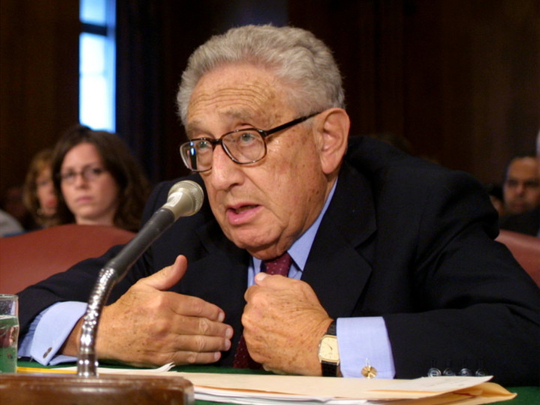
The evil that men do indeed lives after them. Henry Kissinger, 92, is not yet dead, but the dark side of America’s foreign policy that he invented in the 1970s and the sinister machinations that he pursued, all the way from Southeast Asia to the Middle East, Chile to Cyprus and Bangladesh to East Timor, still resound with us in blowback.
We continue to this day to live in his shadow — hence the title of the new book by Greg Grandin, Kissinger’s Shadow: The Long Reach of America’s Most Controversial Statesman.
Henry Kissinger, who, by 1977 had served eight years as national security adviser and secretary of state under Richard Nixon (though it remains unclear who in reality served under whom), worked hard not only at projecting America’s imperial hubris — ordering in the early 1970s CIA-engineered coups in countries like Chile and more bombs dropped on rural Cambodia than had been dropped on Japan during all of the Second World War II — but at conveying in his prodigious volumes the image of himself as a dedicated public servant. Ya, right.
Many investigative journalists, most notably Seymour Hersh in his 1983 masterful work, The Price of Power, and Peter Kombluh’s The Pinochet File, in 2001, have shown us that the image was but a skilful deception by a ruthless cold-warrior, counter-revolutionary and reactionary. The man considered political ethics and moral constraints a frivolous pursuit and treated foreign service officers, including ambassadors, with contempt when they resisted his policies. In a 40,000 two-part series in Harper’s magazine in March-April 2001, Christopher Hitchens went so far as to call Kissinger a war criminal. Now we have a new book by the academic Greg Grandin whose style of writing is imbued more with the panache of a literary journalist, or what used to be called a New Journalist, than the arcane jargon of a scholar — readable, edifying and accessible.
How much of what Grandin has written is new? Not much. But his sprightly analysis of how Kissinger controlled a national security state in “constant, unending war” is masterful. And because that control was infused with more than just a hint of Shakespearian evil, we do not mind re-reading the material. It gives us the chills — and we like that — for that kind of evil is, well, seductive. We return to it. We revisit it because it, improbably, asks us to negate all our pleas for a live, humane social order. It negates, equally improbably, our right to contend for moral literacy.
Consider the blowback — a term coined by the CIA to refer to the unintended consequences of American foreign policy — from the September 11, 1973 coup in Chile, amply documented in Kombluh’s The Pinochet File, and now narrated more extensively in Grandin’s, in which Kissinger was directly involved, via the so-called 40-Committee, in the kidnapping and murder of Chilean commander Rene Schneider on the eve of the coup. (The 40-Committee, discreetly named after a room in the Old Executive Office building and chaired by Kissinger himself, was tasked between 1969 and 1976 with effectively maintaining ultimate supervision over all covert action by the US government.)
The killing, by the coup makers, working with and funded by CIA operatives, culminated in the ouster and death of the duly elected president Salvador Allende and the installation of the Augusto Pinochet military dictatorship. Thousands of political activists, suspected of left-leaning views, were tortured, killed or just made to “disappear”. It was at that time that Kissinger came out with his now infamous expression of contempt for democracy when he observed that he saw no reason why a country should be allowed to “go Communist due to the irresponsibility of its own people”.
It was also around that time that this columnist, active in the journalistic enterprise and on the lecture circuit, became obsessed with researching, lecturing and writing about Kissinger’s underhanded brazenness.
No need to recapitulate here this man’s machinations that led to the massacres in Bangladesh (then East Pakistan), to the Greek-sponsored coup in Cyprus, which prompted a subsequent Turkish invasion of the island nation, to Indonesia’s invasion of East Timor, and to the tragic death of Allende’s former foreign minter and ambassador, Orlando Letelier, along with his American colleague Ronnie Moffit, known as Embassy Row, in Washington. In each case, it is now revealed, Kissinger either knew of, or took an active role in, engineering these shenanigans.
Though not on the same scale of egregiousness, consider Kissinger’s duplicitous relationship with Anwar Sadat, the late Egyptian president.
In the wake of the 1973 October war, when Kissinger mediated the ceasefire talks between Egypt and Israel, known as “shuttle diplomacy”, he was often photographed at Cairo airport being greeted, with kisses planted on both his cheeks, Arab-fashion, by Sadat, who engagingly referred to the American secretary of state with the heavy German accent, as “my friend Henry”. In The Secret Conversations of Henry Kissinger (1976), by Israeli journalist Mati Golan, we read of how in his meetings with Golda Meir at the time, Kissinger dismissed the Egyptian president as “that little buffoon”. (To this day, when Kissinger pens an Op-Ed about Palestine, he refers to the Occupied Territories as “the disputed territories”.)
It is all in the history books, including this splendid new one by Grandin. Henry Kissinger is not a benign, 92-year-old elder statesman. His reputation will never be rehabilitated regardless of how revisionist a view future researchers may adopt of him.
Fawaz Turki is a journalist, lecturer and author based in Washington. He is the author of The Disinherited: Journal of a Palestinian Exile.









